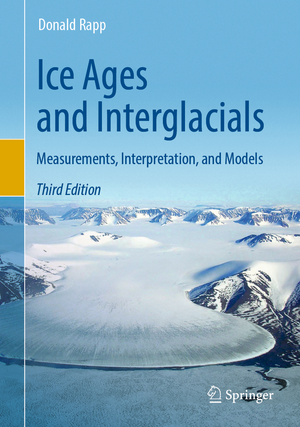Ice Ages and Interglacials: Measurements, Interpretation, and Models
Autor Donald Rappen Limba Engleză Hardback – 29 apr 2019
| Toate formatele și edițiile | Preț | Express |
|---|---|---|
| Paperback (2) | 976.74 lei 39-44 zile | |
| Springer – 8 aug 2014 | 976.74 lei 39-44 zile | |
| Springer Berlin, Heidelberg – 22 noi 2010 | 1104.08 lei 6-8 săpt. | |
| Hardback (2) | 693.93 lei 39-44 zile | |
| Springer International Publishing – 29 apr 2019 | 693.93 lei 39-44 zile | |
| Springer Berlin, Heidelberg – 4 iul 2012 | 968.65 lei 6-8 săpt. |
Preț: 693.93 lei
Preț vechi: 901.22 lei
-23% Nou
Puncte Express: 1041
Preț estimativ în valută:
132.79€ • 139.63$ • 109.72£
132.79€ • 139.63$ • 109.72£
Carte tipărită la comandă
Livrare economică 14-19 aprilie
Preluare comenzi: 021 569.72.76
Specificații
ISBN-13: 9783030104658
ISBN-10: 3030104656
Pagini: 385
Ilustrații: XXIII, 346 p. 149 illus., 105 illus. in color.
Dimensiuni: 168 x 240 x 23 mm
Greutate: 0.73 kg
Ediția:3rd ed. 2019
Editura: Springer International Publishing
Colecția Springer
Locul publicării:Cham, Switzerland
ISBN-10: 3030104656
Pagini: 385
Ilustrații: XXIII, 346 p. 149 illus., 105 illus. in color.
Dimensiuni: 168 x 240 x 23 mm
Greutate: 0.73 kg
Ediția:3rd ed. 2019
Editura: Springer International Publishing
Colecția Springer
Locul publicării:Cham, Switzerland
Cuprins
Preface.- 1. History and Description of Ice Ages.- 2. Variability of the Earth's climate.- 3. Ice core methodology.- 4. Ice core data.- 5. Ocean sediment data. etc.
Notă biografică
Donald Rapp has had a long and varied science and engineering career with since receiving his Ph.D. from the University of California in January 1960. He was a professor for 14 years, and achieved the rank of full professor at the age of 40. Over the years, he has developed a unique talent to move into a field, research it thoroughly, and write an incisive, perceptive summary of that field. His capabilities are widely sought for writing summary technical reports and technical proposals.
He has published numerous scientific papers and eight textbooks: Quantum Mechanics, Statistical Mechanics, Solar Energy, Financial Bubbles, Human Missions to Mars, Use of Extraterrestrial Materials in Human Missions to Mars and the Moon, The Climate Debate, and Assessing Climate Change.
His eight books are summarized at:
http://home.earthlink.net/~drdrapp
He has published numerous scientific papers and eight textbooks: Quantum Mechanics, Statistical Mechanics, Solar Energy, Financial Bubbles, Human Missions to Mars, Use of Extraterrestrial Materials in Human Missions to Mars and the Moon, The Climate Debate, and Assessing Climate Change.
His eight books are summarized at:
http://home.earthlink.net/~drdrapp
Textul de pe ultima copertă
It is not so long ago (a mere 17,000 years – a blink in geologic time) that vast areas of the Northern Hemisphere were covered with ice sheets up to two miles thick, lowering the oceans by more than 120 m. By 11,000 years ago, most of the ice was gone.
Evidence from polar ice cores and ocean sediments show that Ice Ages were persistent and recurrent over the past 800,000 years. The data suggests that Ice Ages were the normal state, and were temporarily interrupted by interglacial warm periods about nine times during this period.
Quasi-periodic variations in the Earth cause the solar input to high northern latitudes to vary with time over thousands of years. The widely accepted Milankovitch theory implies that the interglacial warm periods are associated with high solar input to high northern latitudes. However, many periods of high solar input to high northern latitudes occur during Ice Ages while the ice sheets remain.
The data also indicates that Ice Ages will persist regardless of solar input to high northern latitudes, until several conditions are met that are necessary to generate a termination of an Ice Age. An Ice Age will not terminate until it has been maturing for many tens of thousands of years leading to a reduction of the atmospheric CO2 concentration to less than 200 ppm. At that point, CO2 starvation coupled with lower temperatures will cause desertification of marginal regions, leading to the generation of large quantities of dust. High winds transfer this dust to the ice sheets greatly increasing their solar absorptivity, and at the next up-lobe in the solar input to high northern latitudes, solar power melts the ice sheets over about a 6,000-year interval.
A warm interglacial period follows, during which dust levels drop remarkably. Slowly but surely, ice begins accumulating again at high northern latitudes and an incipient new Ice Age begins.
This third edition presents data and models to support this theory.
Evidence from polar ice cores and ocean sediments show that Ice Ages were persistent and recurrent over the past 800,000 years. The data suggests that Ice Ages were the normal state, and were temporarily interrupted by interglacial warm periods about nine times during this period.
Quasi-periodic variations in the Earth cause the solar input to high northern latitudes to vary with time over thousands of years. The widely accepted Milankovitch theory implies that the interglacial warm periods are associated with high solar input to high northern latitudes. However, many periods of high solar input to high northern latitudes occur during Ice Ages while the ice sheets remain.
The data also indicates that Ice Ages will persist regardless of solar input to high northern latitudes, until several conditions are met that are necessary to generate a termination of an Ice Age. An Ice Age will not terminate until it has been maturing for many tens of thousands of years leading to a reduction of the atmospheric CO2 concentration to less than 200 ppm. At that point, CO2 starvation coupled with lower temperatures will cause desertification of marginal regions, leading to the generation of large quantities of dust. High winds transfer this dust to the ice sheets greatly increasing their solar absorptivity, and at the next up-lobe in the solar input to high northern latitudes, solar power melts the ice sheets over about a 6,000-year interval.
A warm interglacial period follows, during which dust levels drop remarkably. Slowly but surely, ice begins accumulating again at high northern latitudes and an incipient new Ice Age begins.
This third edition presents data and models to support this theory.
Caracteristici
Comprehensive book covering all aspects of ice ages Provides a detailed review of terminations of ice ages including a theory based on dust deposits on ice sheets Offers an up-to-date overview including topics such as climate change
Recenzii
From
the
reviews
of
the
second
edition:
“A complete summary of the most up-to-date information and theories of the history and causes of Quaternary climate change. … In the hands of an experienced researcher, this book offers some excellent and insightful critique of established concepts, theories and methodologies, and explores the issue of correlation versus causation in a number of key areas of palaeoclimatology … . offers a very different perspective and insight into topics that many Quaternary scientists perhaps wrongly assume are no longer controversial.” (Simon Carr, The Holocene, Vol. 24 (7), 2014)
“Scientist/engineer Rapp … has thoroughly revised the first edition of this book … . The volume consists of 11 chapters, 24 pages of references, and a 6-page index. It is profusely illustrated with a combination of color and black-and-white maps and graphs in addition to 11 data tables. … the book contains a wealth of data. … Summing Up: Recommended. Upper-division undergraduates and graduate students.” (J. T. Andrews, Choice, Vol. 50 (7), March, 2013)
“A complete summary of the most up-to-date information and theories of the history and causes of Quaternary climate change. … In the hands of an experienced researcher, this book offers some excellent and insightful critique of established concepts, theories and methodologies, and explores the issue of correlation versus causation in a number of key areas of palaeoclimatology … . offers a very different perspective and insight into topics that many Quaternary scientists perhaps wrongly assume are no longer controversial.” (Simon Carr, The Holocene, Vol. 24 (7), 2014)
“Scientist/engineer Rapp … has thoroughly revised the first edition of this book … . The volume consists of 11 chapters, 24 pages of references, and a 6-page index. It is profusely illustrated with a combination of color and black-and-white maps and graphs in addition to 11 data tables. … the book contains a wealth of data. … Summing Up: Recommended. Upper-division undergraduates and graduate students.” (J. T. Andrews, Choice, Vol. 50 (7), March, 2013)
Descriere
Descriere de la o altă ediție sau format:
In a fully updated second edition, this book offers both history and analysis of extreme climate change on Earth. The book provides an complete and independent summary of the latest data on ice ages and interglacial periods, independent of theory or analysis.
In a fully updated second edition, this book offers both history and analysis of extreme climate change on Earth. The book provides an complete and independent summary of the latest data on ice ages and interglacial periods, independent of theory or analysis.







